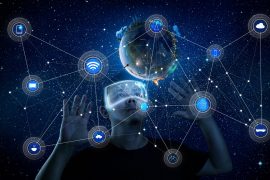Debunking AI Misconceptions

AI is a progressive technology with immense potential. However, the misconceptions around it tend to overshadow its capabilities. Here we aim to debunk some of the most prevalent AI misconceptions.
Loss of Privacy
With AI’s relevance across various industries, privacy has become a concern. Although valid, we can manage these concerns with an understanding of the relationship between data and AI models. There can be checks put in place to limit certain types of data being used to build pervasive AI models.
Additionally, AI-powered tools such as Polisis and Guard analyze privacy policies and provide information on how user data are being leveraged. According to Gartner, 40% of privacy compliance technology will rely on AI by 2023. This means AI technology is combating privacy issues. Data anonymization and security practices such as running solutions over a private cloud are other measures users can take to reduce the risk of privacy compromisation.
AI is only for big companies
While this might have been true a few decades ago, AI and its applications have evolved. Today, small enterprises are capitalizing on AI to streamline operational processes, improve compliance and increase productivity. The AI practices that achieve overall efficiency pave the way for greater improvements.
In a Vistage survey, out of 1467 small and midsize business leaders, almost 30% of the respondents believe AI is among the technologies that will have the most significant impact on their business in the coming years. Even small and mid-sized businesses believe in AI and are considering investing in it.
AI will replace jobs
As AI becomes more powerful, the human workforce fears losing their jobs to technology. According to the Edelman Trust Barometer, 53% of respondents were worried COVID-19 would accelerate the rate at which their employers replace human workers with AI and robots. The truth is AI will replace tasks not jobs. With the growth in work automation, jobs will evolve, generating newer, better opportunities.
According to the World Economic Forum, AI will create 97 million new jobs by 2025. Moreover, about “77% of the companies in the United States and Europe will see no effect in the size of their workforce in response to adopting AI technologies and automation.”
AI can learn itself and take over the world
Another misconception about AI revolves around its self-learning mechanism. While AI is one of our greatest achievements — from programming and implementation to the removal of potential biases and inaccuracies — the technology relies on humans. It’s humans who enable the integration of knowledge and data into AI’s subsequent learning cycles.
We need to understand that AI’s limitless capabilities will only help humans grow and achieve greater milestones.
You can also check our blog that talks about AI ethics: Ethics of Artificial Intelligence.
To learn more about how we are assisting enterprises in their AI journey and helping bust AI myths along the way, visit https://fusemachines.com/success-stories/.
Ready to explore how Fusemachines and AI can help your business? Click here


